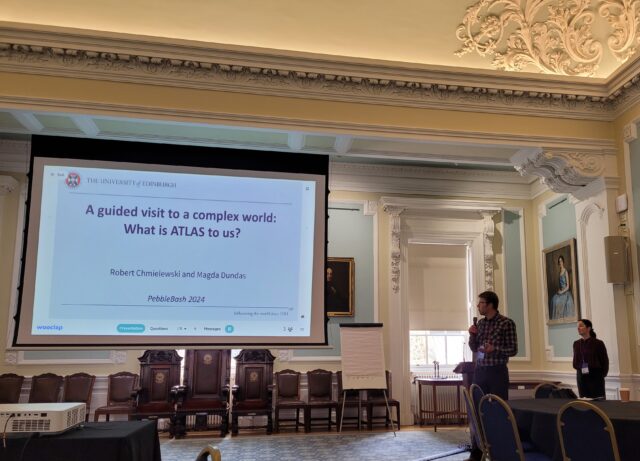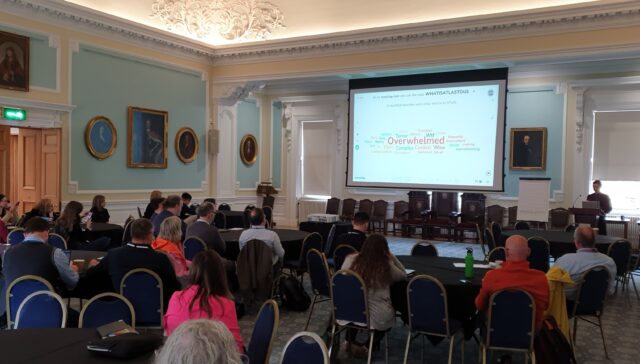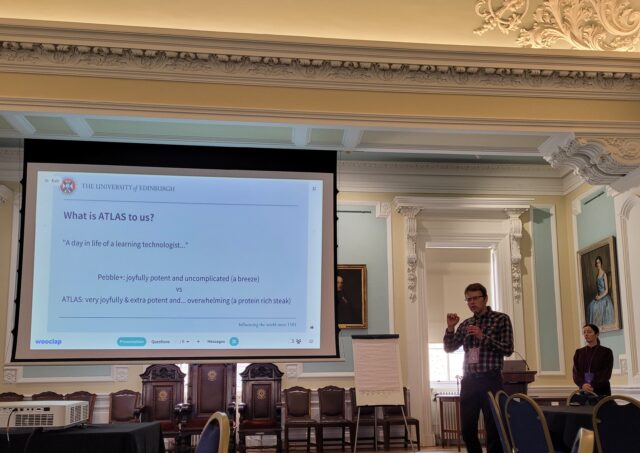Dissecting PebblePad at Surgeon’s Hall

PebblePad service team “actively” represented at PebbleBash 2024.
PebbleBash 2024 conference took place at the Surgeon’s Hall in Edinburgh, offering a chance to re-connect with the PebblePad practitioners from the UK and the rest of the world. The University of Edinburgh’s PebblePad service team was actively represented by Robert Chmielewski and Magda Dundas. One of the “active” components of our appearance there was the delivery of a bespoke workshop called “What is ATLAS to us?”, which we had designed for the occasion.
ATLAS is the main component of the PebblePad system, and our workshop was specifically directed at all types of “ATLAS practitioners” who were ready to spend a bit of time revisiting their practice and reflect on it. Primarily, it was designed for those who introduce others to ATLAS and those who still remember when they were first introduced to ATLAS themselves! The workshop was composed of various tasks to be worked on in micro groups (presenting findings to the whole group) with some tasks involving the whole group (electronic voting).
ATLAS is a key tool for many PebblePad-based projects at the University of Edinburgh, including rich evidence collecting workbooks, large scale peer marking, structured and assessed blogging exercises, or double-blind marking of dissertations – to name a few.
Given the number of our colleagues involved in supporting these – as learning technologists – we often find ourselves having to introduce ATLAS to our new members of staff. During these sessions ATLAS can appear as a very complex, multi-layered offering with a large number of choices and dilemmas – bringing lots of professional satisfaction as well as anxiety. By sharing our experiences and asking others to share theirs, our aim for the workshop was to spend some time untangling these complicated relationships with ATLAS.
The session opened with Robert reflecting on our University of Edinburgh PebblePad projects. He then asked attendees to briefly examine theirs, and revisit/question the popular notion of ATLAS being just a tool that exists somehow “in addition” to PebblePad.
From our experience, the first encounter with ATLAS can be a revealing and even frightening experience. In order to explore the nature of this experience, in the second part of the workshop, Magda took our attendees on the micro-journey of unpicking ATLAS’ presence in our PebblePad-based educational experiences. During this part of the session we were:
- Looking for words to describe users’ initial reactions to ATLAS;
- Creating a ranking of which areas of the interface users find most helpful/confusing;
- Developing a heat map of what parts of ATLAS are most often featured in support calls;
- Imagining ATLAS as a real printed atlas – i.e. which areas of ATLAS would be represented by which areas of the globe and why?
- What traffic signs could we use to help users find their way around ATLAS?

Magda gathering attendees’ ideas via electronic voting.
Later, to add a creative twist to the session, Robert engaged the participants on an even more direct level when it comes to analysing ATLAS’ perception amongst themselves and their students or colleagues. We imagined ATLAS as a person and our impressions of the first encounter, as well as further collaboration. This final segment concluded with an exercise in exploring more complex metaphors which depict the nature of ATLAS most accurately.
Reflecting on the session, we were pleasantly surprised to see how actively the workshop’s participants engaged. The event offered valuable proof that the seemingly untamed potential of ATLAS requires careful handling in how it is introduced and presented to new colleagues.

Robert reflecting on our University of Edinburgh PebblePad projects.
Robert Chmielewski and Magda Dundas
CC BY-SA 4.0.
(Photo by Ed Lithgow CC BY-SA 4.0)
(Robert Chmielewski CC BY-SA 4.0)
(Photo by Ed Lithgow CC BY-SA 4.0.)
(Photo by Robert Chmielewski CC BY-SA 4.0)



